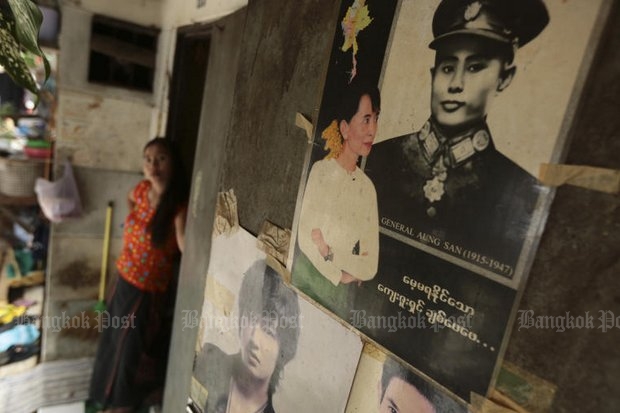
Myanmar's Foreign Minister Aung San Suu Kyi and the Labour Ministry plan to solve the issue of illegal Myanmar migrant workers by slashing their mandatory "work break" period from three years to 30 days.
The approach, which is part of a new Agreement of Employment of Workers to be signed during Ms Suu Kyi's three-day visit to Thailand starting on Thursday, is aimed at discouraging Myanmar workers from working secretly here.
After the labourers' work permits expire, most them do not want to return to Myanmar for a three-year break, as is currently required, before coming back to resume their work in Thailand, a source said yesterday.
Labour Minister Gen Sirichai Distakul will sign the agreement with Ms Suu Kyi.
By law, registered Myanmar workers can renew their work contracts for a combined four-year stay in Thailand but must return to Myanmar for three years after that.
But that is considered "too long" by many workers who decide not to go home and remain here illegally to continue their jobs, the source said.
There are about 1.4 million unskilled Myanmar workers in Thailand, according to the ministry statistics.
Migrant workers' rights advocate Adison Koetmongkhon said the cost of labour registration can be high and some migrant workers avoid reporting to the authorities altogether.
He said it is a serious issue as people from Myanmar make up more than 70% of the total number of migrant workers in Thailand.
Mr Adison called on the Thai and Myanmar governments to reduce the expenses involved in labour registration and related fees. The authorities must strictly enforce the law against people who take advantage of migrant workers, Mr Adison said.
Expenses associated with the job placement process are among issues listed on the Agreement of Employment, the source said, adding Thailand and Myanmar have agreed to push ahead with more effective management of the expenses.
The agreement will pave the way for the establishment of a Thai-Myanmar panel to control costs incurred during the workers' travel to Thailand to ensure they will not bear too high a financial burden, the source said.
Once the workers complete their four years of work and are then required to return home to Myanmar, it is their employers who will be responsible for travel expenses.
This financial obligation is already stated in work contracts, but this agreement will emphasise it and make it clearer, the source said.
Besides the agreement, Ms Suu Kyi will also sign a memorandum of understanding on labour cooperation, which includes issues such as academic cooperation and workers' skill development, the source added.
Meanwhile, Ratree Polsarnsophon, 45-year-old, a Myanmar employee at one of the oldest grocery stores in Samut Sakhon's Mahachainiwet village, said she found the work registration which includes nationality verification for migrant workers, to be complicated and expensive.
"If my passport becomes invalid in the next few months, my only option is to go back to Myanmar and wait for one month or two to get a new one.
"I do not want to stay there for that long as my family and business are here," Ms Ratree, originally from Mawlamyine city, who has been working in Thailand for more than 25 years told the Bangkok Post yesterday.
"I understand the governments of both countries want to put in place a more effective system to regulate migrant workers, but it should be more affordable and convenient for us too," she said.
Under the new system, Ms Ratree said, migrant workers are required to obtain or have their passports reissued only in their home countries.
